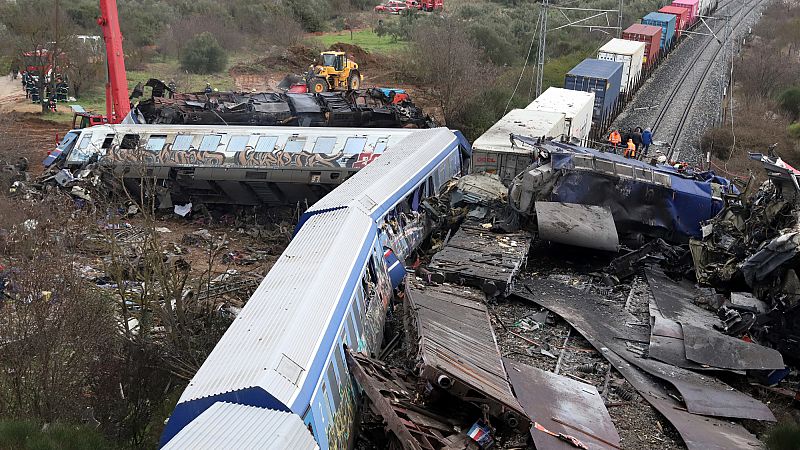
The trial of those responsible for the deadly train crash in Tempi has been beset by delays, with investigations still ongoing two years on from the collision in Greece that killed 57.
Hearings may not begin until late 2025, according to Greek newspaper Kathimerini, which attributed the delays to a range of factors, including requests by victims’ relatives for testimonies from further witnesses.
The trial date is also being set back by factors including pending autopsy and expert reports, investigations into footage allegedly related to the disaster, and a lawsuit against an investigating judge, the newspaper reported.
Euronews contacted the Greek Ministry of Justice for comment on the trial's reported timeline. It also made these requests to lawyers representing the victims' families.
Last month, investigating judge Sotiris Bakaimis ordered the authenticity of new footage, which allegedly shows the freight train before its collision with the passenger train, to be examined.
Previously released videos of the incident show a massive explosion following the collision, which some believe suggests that the freight train transported illegal, flammable materials.
A forensic investigator hired by victims' families has alleged that 30 of the 57 passengers who died in the incident initially survived the crash before being killed in the fire.
If the lawsuit against Bakaimis, brought by five relatives of victims who claim he has mishandled evidence, goes ahead, further delays are reportedly likely.
The developments follow the publication of a long-awaited report into the deadliest train crash in Greece’s history. As well as exposing deep-rooted issues with the country's transport infrastructure, the disaster has come to be seen by many as an exemplification of institutional failure in Greece.
Released in February, on the eve of the incident’s second anniversary, it blamed human error, ageing railway infrastructure, and key systemic failures for the disaster. Poor training and staff shortages were also identified as contributing factors.
The report, which was authored by an independent investigative committee, concluded that the collision occurred after a station master made a routing mistake that directed a passenger train onto the same track as an oncoming freight train. The resulting crash killed 46 passengers, mostly students, and 11 staff members.
It also found that had modern safety technologies been implemented, the accident would not have happened.
The second anniversary of the crash was marked by a general strike and a wave of mass protests in Greece, with tens of thousands gathering in Athens' Syntagma Square.
Victims’ families have accused Prime Minister Kyriakos Mitsotakis’ government of mishandling the investigation, while there have also been mounting allegations of a cover-up. Earlier this month, Mitsotakis’ cabinet faced a vote of no-confidence, which it survived.
.jpg?w=600)






